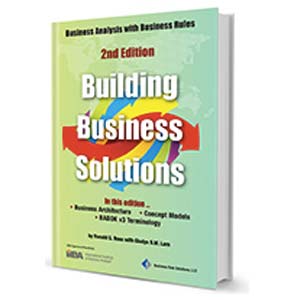Eight Steps to Crafting a Business Rule — Step 5: Choose the Form of the Business Rule Keyword ('must' or 'only')
Last month, I discussed the importance of starting a business rule with the correct subject. Once that is done, the next step is easy. You just have to choose the appropriate rule keyword.
When using the RuleSpeak® technique for writing business rules[1] (as we are throughout this series of articles), it is a requirement (well, a rule actually) that you have to use either 'must' or 'only' in a business rule (but not both!). These keywords indicate the constraint inherent in the rule.
Must
'must' indicates obligation. It is very straightforward; there is no wriggle room — you have to follow the rule.[2]
For example, you might have a business rule:
A pilot must have a valid pilot's license.
The rule is unequivocal. Every pilot has to have a valid pilot's license.
Some of the kinds of rules that use 'must' are:
- calculations
- Example: The total amount of an order must be computed as the sum of all order item amounts.
- mandatory properties of something
- Example: A vehicle must have a vehicle model.
- mandatory verb concepts (i.e., relationships between concepts)
- Example: A policy must be held by at least one customer.
- mandatory instances of something
- Example: A risk rating must be one of the following:
- High Risk
- Medium Risk
- Low Risk.
- mandatory restrictions in a process
- Example: An order must be approved by a manager if the total order amount is greater than $10,000.
Only
'only' should be paired with 'may' (as in: You may do this only if you meet these conditions.). It indicates permission to do something. For example:
A pilot may land in Hong Kong only if the pilot has qualified for Hong Kong landings within the last 12 months.
In this case, not all pilots have to land in Hong Kong; there is no sense of 'must'. If one is to land there, however, they will be granted permission to do so only if they are qualified.
One of the oddities in rule logic is that the forms "may…only" and "must not" are logically equivalent. So the rule above could be rewritten as:
A pilot must not land in Hong Kong if the pilot has not qualified for Hong Kong landings within the last 12 months.
So which form is preferable? Well, I tend to prefer the "may…only" because I find that you often end up with double-negatives with 'must not' and that can get confusing.
Some of the kinds of rules that use 'only' are:
- limits on verb concepts (i.e., relationships between concepts)
- Example: A coverage may have only one deductible.
- derivation rules (i.e., defining a concept through a business rule):[3]
- Example: A customer may be considered a gold customer only if the customer has had at least 5 vehicle rentals in the last 6 months.
Summary
So now you've picked the subject and the rule keyword for the rule statement. The next step is to say something more about the subject. We'll talk about that next month. But be forewarned — you'll need a concept model (aka fact model) to properly do the next step.
Notes:
[1] See www.RuleSpeak.com for more information on RuleSpeak®. ![]()
[2] You can lessen the strictness by specifying a different 'level of enforcement', but that should be kept out of the rule per se. ![]()
[3] See Step 3 in this series for a discussion of derivation rules. ![]()
General References:
Building Business Solutions: Business Analysis with Business Rules, by Ronald G. Ross with Gladys S.W. Lam, An IIBA® Sponsored Handbook, Business Rule Solutions, LLC, October 2011, 304 pp. URL: http://www.brsolutions.com/bbs
For more information on the RuleSpeak® technique, visit www.RuleSpeak.com
# # #
About our Contributor:
Online Interactive Training Series
In response to a great many requests, Business Rule Solutions now offers at-a-distance learning options. No travel, no backlogs, no hassles. Same great instructors, but with schedules, content and pricing designed to meet the special needs of busy professionals.











